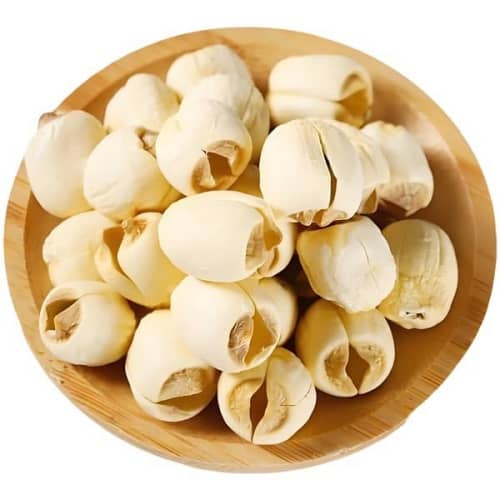Lotus seeds, also known as莲实 (Lian Shi),藕实 (Ou Shi), or莲蓬子 (Lian Peng Zi), are the mature seeds of the lotus plant, a member of the Nymphaeaceae family. These seeds are large, full, and white in color, with a starchy, powdery texture that becomes soft and tender when cooked. Known for their incredible vitality, lotus seeds are considered one of the most resilient seeds in the world. Even after centuries, they can still sprout and grow when provided with the right conditions. In China, lotus seeds have been a prized food and medicinal ingredient for centuries. Today, they remain a high-quality health food and a common ingredient in medicinal cuisine.

Table of Contents
- Source and Types of Lotus Seeds
- Nature, Taste & Meridians
- Main Functions & Traditional Applications
- Modern Research & Applications
- Consumption Methods & Precautions
1. Source and Types of Lotus Seeds
Lotus seeds, also known as lotus nuts, are the mature seeds of the lotus plant. They are typically white, large, and plump, with a powdery texture. The seeds are highly prized in Chinese culture for their resilience and longevity, able to germinate and grow after hundreds of years under the right conditions. These seeds have a long history in both food and medicine, and they continue to be a valuable ingredient in modern health supplements.
2. Nature, Taste & Meridians
📌 Taste: Sweet, astringent
📌 Nature: Neutral
📌 Meridians: Spleen, Kidney, Heart
Lotus seeds are known for their balanced properties. They are sweet and astringent, acting on the spleen, kidney, and heart meridians. Lotus seeds help to strengthen the digestive system, nourish the kidneys, and calm the mind, making them a great all-around health food.
3. Main Functions & Traditional Applications
✅ Strengthens the spleen and digestive system: Lotus seeds help with appetite loss and chronic diarrhea.
✅ Calms the mind and improves sleep: Often used in traditional remedies for insomnia, with the saying “Add white lotus to your porridge to prevent sleeplessness.”
✅ Treats kidney-related issues: Lotus seeds are used to address kidney weakness, helping with symptoms like frequent urination and nocturnal emissions.
✅ Soothes heart palpitations and anxiety: Helps with anxiety, palpitations, and restlessness, commonly seen in heart weakness.
✅ Lowers blood pressure: Lotus seeds are known to have a mild blood pressure-lowering effect, helpful for hypertension.
4. Modern Research & Applications
Modern research has revealed that lotus seeds are rich in nutrients, such as starch, sugar, and protein, and possess antioxidant and anti-aging properties. The active components in lotus seeds can regulate the endocrine system and promote better sleep. They are also used as health supplements to boost overall well-being.
5. Consumption Methods & Precautions
Although lotus seeds are highly beneficial, there are some precautions to consider when consuming them:
- People to Avoid:
- Those with indigestion or bloating: Raw lotus seeds may cause bloating.
- People with constipation: Due to their astringent nature, fresh lotus seeds may worsen constipation.
- Low blood pressure individuals: As lotus seeds can lower blood pressure, excessive consumption may worsen symptoms.
- Diabetic patients: Lotus seeds contain a high amount of sugar, and should not be consumed in excess by those with diabetes.
- Best Consumption Methods:
Lotus seeds can be cooked in soups, porridge, or desserts. They are most beneficial when cooked, and can also be used in medicinal dishes for health benefits.
✅ Conclusion
Lotus seeds are an excellent food with a wide range of health benefits. They help to strengthen the digestive system, calm the mind, and promote better sleep. However, as with any food, they should be consumed in moderation and with consideration of individual health conditions. When used appropriately, lotus seeds can play a valuable role in maintaining good health.